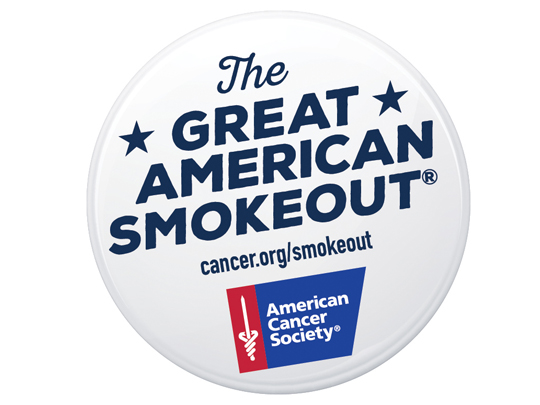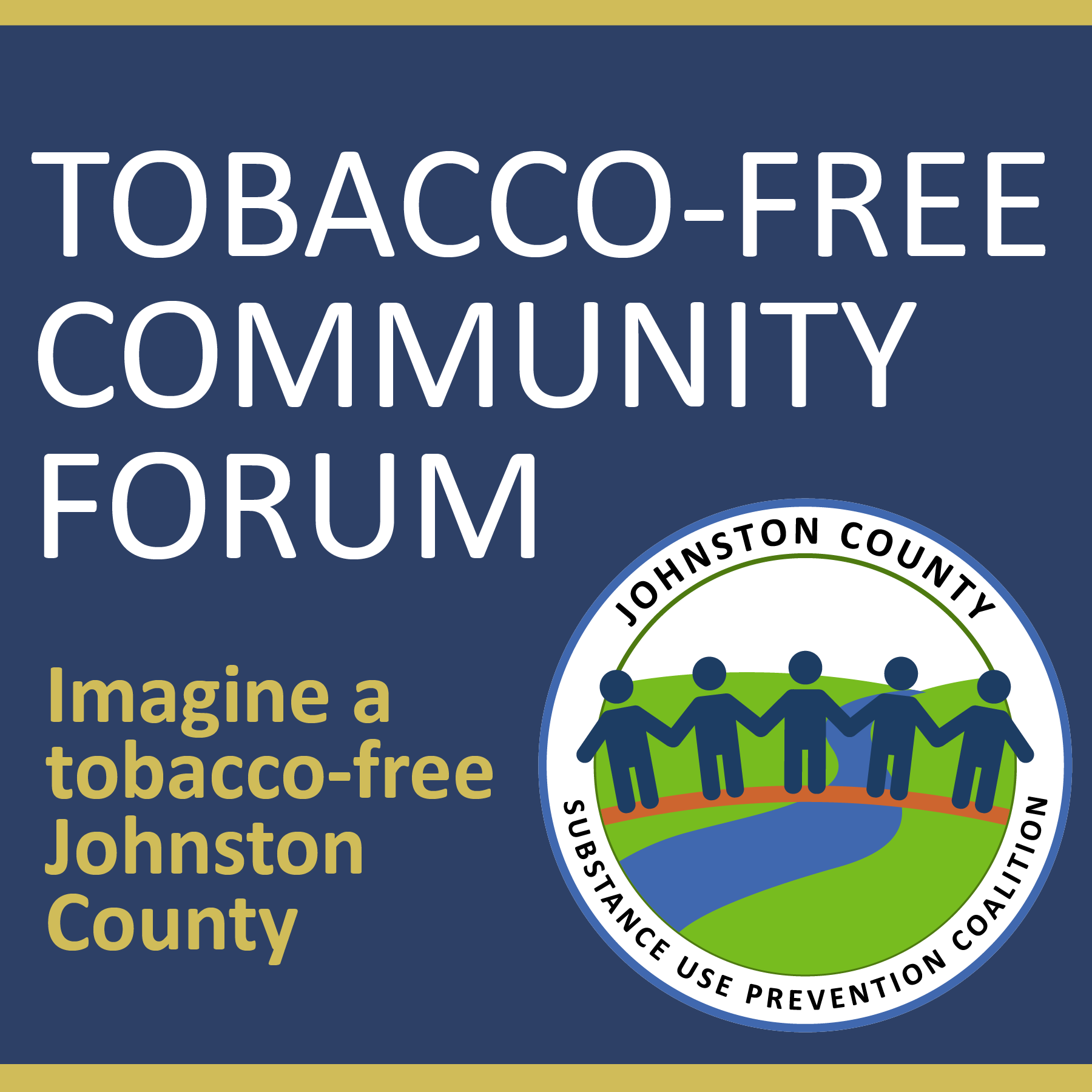
Vaping: Not Worth the Risk
Toshia Jordan, MS
Substance Use Prevention Coalition Coordinator of Fuquay Varina
 Each year, the Great American Smokeout encourages individuals to put down their cigarettes and vapes. As the COVID-19 pandemic continues, the message has become even more critical as we learn more about the health effects of vaping through new studies. While we always suspected vaping to be bad for the health of our youth, the data is starting to come in and what we suspected is unfortunately true. Vaping damages the lungs and vaping substances like nicotine negatively affects the growing brain of youth (USDHHS). The damage to the lungs from vaping is especially a concern with COVID-19. A study from Stanford found that teenagers who vape have are 7 times more likely to have COVID-19 than peers who do not vape. Another real concern is the impact substances like nicotine have on the growing brain, priming the brain for future addiction (USDHHS). None of these outcomes are desired and they threaten the future of our youth. We must take a closer look at what is going on and what we can do to best support and protect our youth.
Each year, the Great American Smokeout encourages individuals to put down their cigarettes and vapes. As the COVID-19 pandemic continues, the message has become even more critical as we learn more about the health effects of vaping through new studies. While we always suspected vaping to be bad for the health of our youth, the data is starting to come in and what we suspected is unfortunately true. Vaping damages the lungs and vaping substances like nicotine negatively affects the growing brain of youth (USDHHS). The damage to the lungs from vaping is especially a concern with COVID-19. A study from Stanford found that teenagers who vape have are 7 times more likely to have COVID-19 than peers who do not vape. Another real concern is the impact substances like nicotine have on the growing brain, priming the brain for future addiction (USDHHS). None of these outcomes are desired and they threaten the future of our youth. We must take a closer look at what is going on and what we can do to best support and protect our youth.
Why Do Youths Try E-Cigarettes?
 The new report from CDC states that among students who reported ever having tried e-cigarettes, 55.3% tried because of curiosity, 30.8% tried because a friend or family member used them, and 22.4% tried because they are available in flavors. Although efforts were made to counter the issue of flavors, teens are still able to get flavored disposable vape products that are not currently restricted. In addition, the concern is that teens will be drawn to vaping since we know that in times of stress substance use increases. Teens are facing all the typical stresses that go along with being a teen and now added ones around COVID-19, quarantine, and virtual learning. Although this is the case, it does not end here. We can work together to support our youth and protect their future by addressing each issue one at a time.
The new report from CDC states that among students who reported ever having tried e-cigarettes, 55.3% tried because of curiosity, 30.8% tried because a friend or family member used them, and 22.4% tried because they are available in flavors. Although efforts were made to counter the issue of flavors, teens are still able to get flavored disposable vape products that are not currently restricted. In addition, the concern is that teens will be drawn to vaping since we know that in times of stress substance use increases. Teens are facing all the typical stresses that go along with being a teen and now added ones around COVID-19, quarantine, and virtual learning. Although this is the case, it does not end here. We can work together to support our youth and protect their future by addressing each issue one at a time.
How to Protect The Futures of our Youth
• Increase Health Awareness: Educating teens in ways that resonate with them will make all the difference in their openness to receive and trust the information. Sharing facts about the relationship to brain development and addiction, leading to a loss of control, is a great way to increase health awareness in terms that are important to them. The website Fresh Empire: Keep it fresh, Live Tobacco-Free does a great job of explaining addiction in an approachable way.
• Be a Good Example: Many times, it is easier to say than to do, but it is so important for the well-being of our teens to see good examples. We all know that they are more likely to imitate what they see versus what they hear. Be intentional about being a good example. It is also important to note that while substance use is never preferred, it definitely is not a good combination while a teen’s brain is still growing and developing.

• Start a Conversation: While leading by example is essential, don’t forsake conversations either. It is incredible how time spent to show you care can make all the difference. Set clear expectations for your family and encourage open lines of communication. This website is a great resource for talking with your teen.
• Limit Social Media: While there are some benefits to social media, some studies show that being on social media nonstop has adverse effects on teens and their self-esteem. The Recovery Village has a great article entitled, “How Social Media Impacts Teens”. This article states, “Research on social media and teens indicated that technology may increase peer pressure and bullying, while also leading to increased substance use and mental health concerns.” Protect your teens by monitoring what they are exposed to and limiting time spent on social media.
• Develop Healthy Coping Alternatives: Everyone seems to be dealing with some level of stress during these difficult times. This is a great opportunity to not only update your healthy coping alternatives but also to encourage your teens to develop some of their own. The Center for Parent and Teen Communication has a great resource to help your teen build a stress management plan.
Vaping has increased in recent years along with many challenges, but it does not have to become the narrative for our youth. With the COVID connection, data to support reasons for trying, and new and old stressors, we must help our teens develop healthy alternatives that build resilience. Together we can work to support and protect our youth. We can help our youth become resilient in the face of life’s challenges and resolute in the fact that vaping just is not worth the risk.
Resources:
US Department of Health and Human Services. E-cigarette Use Among Youth and Young Adults: A Report of the Surgeon General. Atlanta, GA: CDC; 2016 Accessed October 19, 2020.
Vaping Linked to COVID-19 Risk in Teens and Young Adults.
Fewer than half of young people are aware of the connection between vaping and COVID-19 risk.
6.2 Million Middle & High School Students used tobacco products in 2019.
Fresh Empire: Keep it Fresh. Live Tobacco-Free.
Helpful Parent Tip sheet on Vaping
Featured Poe Event: Johnston County Tobacco-Free Community Forum
When: Via Zoom on Thursday, November 19, 2020, from 11:30 a.m. – 1:30 p.m.
You’re invited to join us as we work towards a tobacco-free Johnston County! Johnston County Substance Use Prevention Coalition, together with Poe, is hosting this virtual event at no cost for the community.
In this community forum, we will hear from experts about the health impacts of the vaping epidemic, discuss policies that create tobacco-free environments, and make action plans for a healthier Johnston County. This event is presented in partnership with Johnston Health, Johnston County Health Department, and Alliance Health.
Register today! A few days before the event, you will get an email detailing how to join our virtual forum.
Featured Poe Program: Vaping 101
Grade Level: 6th – 12th
Program Length: 60 minutes
 Vaping 101 shows participants the latest research about the addictive nature of nicotine and how it impacts the growing brain and body. This program will cover important resources and skills to empower healthy decision making to navigate this and other substance use issues. Participants will be engaged in a group game format, videos, and discussion.
Vaping 101 shows participants the latest research about the addictive nature of nicotine and how it impacts the growing brain and body. This program will cover important resources and skills to empower healthy decision making to navigate this and other substance use issues. Participants will be engaged in a group game format, videos, and discussion.
To schedule a virtual program with Poe, contact our scheduler Amanda Bodenheimer at [email protected] today.
